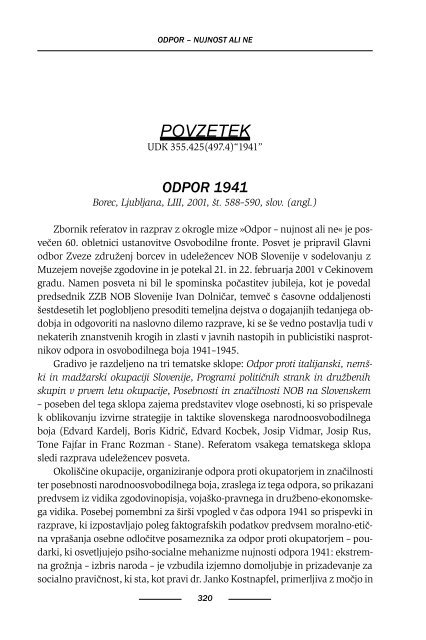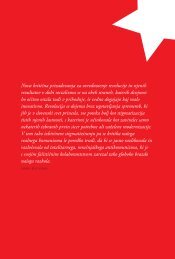POVZETEK
POVZETEK
POVZETEK
Create successful ePaper yourself
Turn your PDF publications into a flip-book with our unique Google optimized e-Paper software.
ODPOR – NUJNOST ALI NE<br />
<strong>POVZETEK</strong><br />
UDK 355.425(497.4)“1941”<br />
ODPOR 1941<br />
Borec, Ljubljana, LIII, 2001, št. 588–590, slov. (angl.)<br />
Zbornik referatov in razprav z okrogle mize »Odpor – nujnost ali ne« je posvečen<br />
60. obletnici ustanovitve Osvobodilne fronte. Posvet je pripravil Glavni<br />
odbor Zveze združenj borcev in udeležencev NOB Slovenije v sodelovanju z<br />
Muzejem novejše zgodovine in je potekal 21. in 22. februarja 2001 v Cekinovem<br />
gradu. Namen posveta ni bil le spominska počastitev jubileja, kot je povedal<br />
predsednik ZZB NOB Slovenije Ivan Dolničar, temveč s časovne oddaljenosti<br />
šestdesetih let poglobljeno presoditi temeljna dejstva o dogajanjih tedanjega obdobja<br />
in odgovoriti na naslovno dilemo razprave, ki se še vedno postavlja tudi v<br />
nekaterih znanstvenih krogih in zlasti v javnih nastopih in publicistiki nasprotnikov<br />
odpora in osvobodilnega boja 1941–1945.<br />
Gradivo je razdeljeno na tri tematske sklope: Odpor proti italijanski, nemški<br />
in madžarski okupaciji Slovenije, Programi političnih strank in družbenih<br />
skupin v prvem letu okupacije, Posebnosti in značilnosti NOB na Slovenskem<br />
– poseben del tega sklopa zajema predstavitev vloge osebnosti, ki so prispevale<br />
k oblikovanju izvirne strategije in taktike slovenskega narodnoosvobodilnega<br />
boja (Edvard Kardelj, Boris Kidrič, Edvard Kocbek, Josip Vidmar, Josip Rus,<br />
Tone Fajfar in Franc Rozman - Stane). Referatom vsakega tematskega sklopa<br />
sledi razprava udeležencev posveta.<br />
Okoliščine okupacije, organiziranje odpora proti okupatorjem in značilnosti<br />
ter posebnosti narodnoosvobodilnega boja, zraslega iz tega odpora, so prikazani<br />
predvsem iz vidika zgodovinopisja, vojaško-pravnega in družbeno-ekonomskega<br />
vidika. Posebej pomembni za širši vpogled v čas odpora 1941 so prispevki in<br />
razprave, ki izpostavljajo poleg faktografskih podatkov predvsem moralno-etična<br />
vprašanja osebne odločitve posameznika za odpor proti okupatorjem – poudarki,<br />
ki osvetljujejo psiho-socialne mehanizme nujnosti odpora 1941: ekstremna<br />
grožnja – izbris naroda – je vzbudila izjemno domoljubje in prizadevanje za<br />
socialno pravičnost, ki sta, kot pravi dr. Janko Kostnapfel, primerljiva z močjo in<br />
320
<strong>POVZETEK</strong><br />
veličastnostjo vulkanskega izbruha. Potreba po pravičnosti, zatiranju krivice in<br />
zla je elementarna potreba človeka kot presežnega bitja in vznika iz njegovega<br />
odnosa do narave, zemlje kot eruptivne sile. Vprašanja o družbeno-ekonomski<br />
ureditvi, o socialnih ciljih narodnoosvobodilnega boja itd., ki jih postavlja marsikateri<br />
razpravljavec, so tudi vzporednica z današnjimi družbeno-ekonomskimi<br />
in političnimi razmerji sil in vrednostna ocena razmer v procesih globalizacije<br />
sveta, v katerih je občutno premalo poudarka na razvijanju čuta za solidarnost<br />
in osebno odgovornost.<br />
Avtorji referatov: Dušan Biber (Nemška manjšina na Slovenskem – vprašanje<br />
nacifikacije, NOB Slovenije v zavezniških dokumentih), Zdenko Čepič (Programi<br />
političnih strank in družbenih skupin v prvem letu okupacije – Uvodni<br />
poudarki, Revolucionarnost Osvobodilne fronte, Prispevek vodstva in vloga osebnosti<br />
v oblikovanju izvirne strategije ter taktike upora in NOB – Uvodni poudarki),<br />
Vida Deželak - Barič (Avtonomnost OF in odzivi osrednjega jugoslovanskega<br />
vodstva NOG, Vloga Edvarda Kardelja v osvobodilnem boju in revoluciji), Tone<br />
Ferenc (Nemške imperialistične zahteve do slovenskega ozemlja, Položaj slovenskega<br />
naroda ob okupaciji), Bojan Godeša (Nekateri vidiki razmerja med vsejugoslovanskim<br />
in slovenskim razvojem v času druge svetovne vojne, Tone Fajfar<br />
in njegov pogled na Osvobodilno fronto), Vekoslav Grmič (Etična dilema – upreti<br />
se ali ne?), Damijan Guštin (Bistvene razlike med razvojem NOB na vojaškem<br />
področju v Sloveniji in drugih jugoslovanskih pokrajinah ter sosednjih narodih),<br />
Matjaž Kmecl (Slovenstvo Josipa Vidmarja), Peter Kovačič Peršin (Kocbekovo<br />
partizanstvo), Dušan Nećak (Politične in socialne razmere v Evropi in svetu ob<br />
začetku druge svetovne vojne), Jurij Perovšek (Odnos političnih strank in skupin<br />
do fašizma in nacizma pred drugo svetovno vojno), Janko Pleterski (Odpor – nujnost<br />
ali ne?, Posebnosti in značilnosti NOB na Slovenskem – Uvodni poudarki,<br />
Mednarodna uveljavitev NOB Slovenije), Božo Repe (Odpor proti italijanski,<br />
nemški in madžarski okupaciji Slovenije – Uvodni poudarki, Stališča evropskih<br />
odporniških gibanj o nujnosti političnih in družbenih sprememb v povojni ureditvi,<br />
Boris Kidrič – glavni tvorec in »motor« Osvobodilne fronte), Veljko Rus<br />
(Prispevek Josipa Rusa in slovenskega Sokola k nastanku Osvobodilne fronte),<br />
Cvetka Tóth (Uporništvo kot volja do življenja), Nevenka Troha (Imperialistične<br />
zahteve Italije do Jugoslavije), Anka Vidovič - Miklavčič (Seznanjenost z bistvom<br />
fašizma in nacizma ter njune zasedbene politike pred drugo svetovno vojno),<br />
Marjan Žnidarič (Franc Rozman – Stane: vojak in človek).<br />
V razpravah, ki so sledile vsakemu tematskemu sklopu, so sodelovali: Tone<br />
Ferenc, Božidar Gorjan, Ignac Gregorač, Vlado Habjan, Ivan Jan, Zdravko Klanjšček,<br />
Lado Kocijan, Janko Kostnapfel, Ivan Križnar, Franc Miklavčič, Karlo Na-<br />
321
ODPOR – NUJNOST ALI NE<br />
nut, Bogdan Osolnik, France Perovšek, Janez Stanovnik, Franci Šali, Živa Vidmar<br />
in Marko Vrhunec.<br />
Predavatelji in razpravljavci so si bili kljub določenim razlikam v pogledih<br />
in interpretacijah nekaterih vprašanj enotni: odpor je bil nujen in z njim smo<br />
ubranili najvišji nacionalni interes – moralno, kulturno, državotvorno in tudi<br />
fizično ohranitev slovenstva.<br />
322
SUMMARY<br />
SUMMARY<br />
UDC 355.425(497.4)“1941”<br />
RESISTANCE 1941<br />
Borec, Ljubljana, LIII, 2001, No. 588–590, Slovene (English)<br />
This collection of papers and discussions from the round table “Resistance<br />
– Necessity or Not” is dedicated to the 60th anniversary of the Liberation Front<br />
foundation. The round table was organised by the Republic Committee of the<br />
Union of the Veterans of the National Liberation Struggle Associations and the<br />
Museum of Recent History. It took part between 21st and 22nd February 2001<br />
in the Cekinov grad in Ljubljana. It’s goal was not only to honourably celebrate<br />
the jubilee, but – as the president of the Union Ivan Dolničar has said – from<br />
the time distance of 60 years to judge profoundly some basic facts of the events<br />
in that time, as well as to answer the discussion’s title dilemma, which is still<br />
present in certain scientific circles and public appearances and publications of<br />
the NLS’s opponents.<br />
The material is divided in three parts: Resistance against Italian, German<br />
and Hungarian Occupation of Slovenia, The Programmes of Political Parties<br />
and Social Groups in the First Year of Occupation, and Particularities and Characteristics<br />
of National Liberation Struggle in Slovenia. A special part of the third<br />
theme discusses about the role of personalities and their contribution to the<br />
constitution of an authentic strategy and tactics of the resistance and Slovenian<br />
national liberation struggle – NLS (Edvard Kardelj, Boris Kidrič, Edvard Kocbek,<br />
Josip Vidmar, Josip Rus, Tone Fajfar and Franc Rozman - Stane). A discussion<br />
of the conference participants follows after each section.<br />
The circumstances of occupation, the organisation of resistance, and characteristics<br />
and particularities of the national liberation struggle, which has risen<br />
from the resistance, are foremost represented from the historical point of view,<br />
but also from the military-juridical and socio-economic ones.<br />
Especially important for the in-depth analysis are those contributions and<br />
papers, which beside factual data emphasise morally-ethical dilemmas of one’s<br />
personal decision for resistance against the occupiers – emphasises which throw<br />
323
ODPOR – NUJNOST ALI NE<br />
light on the psycho-social mechanisms of necessity of the resistance in 1941:<br />
the extreme threat – the elimination of Slovene nation – has agitated extreme<br />
patriotism and strive for social justice, which can be, with the words of Dr Janko<br />
Kostnapfel, compared with power and glory of volcanic eruption. The need<br />
for justice, suppression of injustice and evil is an elementary need of a man as<br />
a transcending being and grows from his attitude towards nature, earth as an<br />
eruptive force. The questions about social-economic arrangement, about social<br />
goals of the national liberation struggle etc., which have been asked by many<br />
participants, are also a parallel to the today’s social-economic and political power<br />
relations and a kind of judgement of conditions in the process of world<br />
globalisation, in which one finds considerable lack of emphasise on the development<br />
of a sense for solidarity and personal responsibility.<br />
The authors of papers: Dušan Biber (German Minority in Slovenia – the<br />
Question of Nazification, National Liberation Struggle of Slovenia in Allied Documents),<br />
Zdenko Čepič (The Programmes of Political Parties and Social Groups in<br />
the First Year of Occupation – Introduction, Revolutionary Elements in Liberation<br />
Front, The Contribution of Leadership and the Role of Personality in the Constitution<br />
of Authentic Strategy and Tactics of the Resistance and National Liberation<br />
Struggle – Introduction), Vida Deželak - Barič (The Autonomy of Liberation Front<br />
and Responses of the Yugoslav National Liberation Movement Leadership, The<br />
Role of Edvard Kardelj in Liberation Struggle and Revolution), Tone Ferenc (The<br />
Imperialistic Demands of Germany towards Slovene Territory, The Situation of<br />
Slovene Nation at the Beginning of Occupation), Bojan Godeša (Some Aspects<br />
of Relation between the Development in Yugoslavia and Slovenia during WW II,<br />
Tone Fajfar and his View on Liberation Front), Vekoslav Grmič (The Ethical Dilemma<br />
– to Resist or Not?), Damjan Guštin (Some Essential Differences between<br />
the Development of NLS on Military Domain in Slovenia and other Yugoslav<br />
Provinces and Neighbouring Nations), Matjaž Kmecl (Josip Vidmar’s View on<br />
Slovene Nationality), Peter Kovačič Peršin (Kocbek’s View on the Partisan Movement),<br />
Dušan Nećak (Political and Social Circumstances in Europe and World<br />
at the Beginning of WW II), Jurij Perovšek (The Relation of Political Parties and<br />
Groups towards Fascism and Nazism before WW II), Janko Pleterski (Resistance<br />
– Necessity or Not?, Particularities and Characteristics of National Liberation<br />
Struggle in Slovenia – Introduction, The International Recognition of Slovenian<br />
National Liberation Struggle), Božo Repe (Resistance against Italian, German<br />
and Hungarian Occupation of Slovenia – Introduction, The European Resistance<br />
Movements Standpoints about the Necessity of Political and Social Changes<br />
in After-War Systems, Boris Kidrič – The Main Actor and “Engine” of Liberation<br />
324
<strong>POVZETEK</strong><br />
Front), Veljko Rus (The Contribution of Josip Rus and Slovenian Sokol Organisation<br />
to the Commence of Liberation Front), Cvetka Tóth (Rebellion as a Will to<br />
Life), Nevenka Troha (Imperialistic Demands of Italy towards Yugoslavia), Anka<br />
Vidovič - Miklavčič (Acquaintance with the Essence of Fascism and Nazism and<br />
their Occupation Policy before WW II), Marjan Žnidarič (Franc Rozman – Stane:<br />
a Soldier and a Man).<br />
Discussions which followed were contributed by Tone Ferenc, Božidar Gorjan,<br />
Ignac Gregorač, Vlado Habjan, Ivan Jan, Zdravko Klanjšček, Lado Kocijan,<br />
Janko Kostnapfel, Ivan Križnar, Franc Miklavčič, Karlo Nanut, Bogdan Osolnik,<br />
France Perovšek, Janez Stanovnik, Franci Šali, Živa Vidmar and Marko Vrhunec.<br />
In spite of some differences in views and interpretations of some questions,<br />
the lecturers and debaters were united: the resistance in 1941 was necessary<br />
and through it we have defended the highest national interest – a moral, cultural<br />
and physical preservation of Slovenes as a nation.<br />
325






